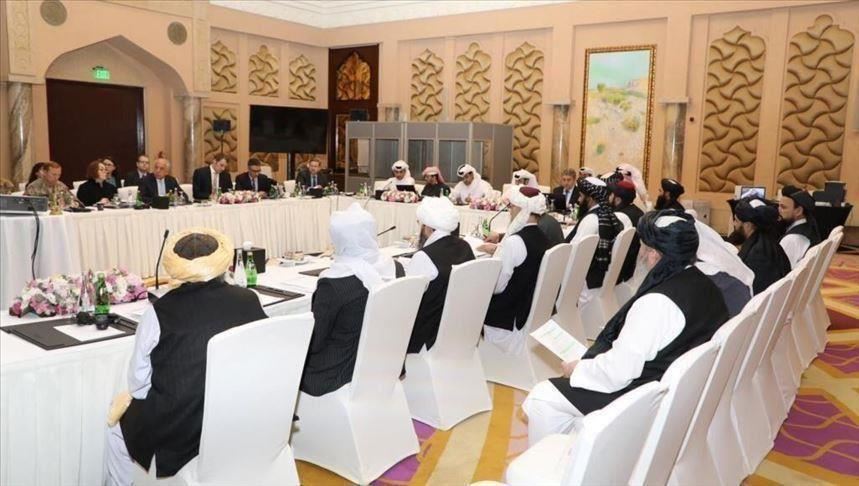In an interview with the website of the Strategic Council on Foreign Relations, Dr Kiomars Yazdanpanah cited US Secretary of Defense’s remarks on reaching an imminent agreement with the Taliban aimed at reducing tensions and said in the current situation, Americans are pursuing a dual strategy of negotiating peace with the Taliban. Both the beginning and the end seem to be a mystery.
He added: “Experience has shown that in the process of playing with his effective foreign policy leverages, Trump has set Afghanistan as prey to win a second term in the US elections. Therefore, the first stance of this dual American behaviour is the superior leverage and power of 2020 election campaign because reducing the role with Afghanistan can still be a vote-winning topic of debate in Trump’s foreign policy.”
US Sponsored Afghan Peace Is Devious
The university professor described the justification for a long-term presence in Afghanistan as America’s second foreign-policy stance in Afghanistan, saying that the US-sponsored peace in Afghanistan is undoubtedly a deterrent to peace and stability in the country. If the Americans were to establish peace in Afghanistan, twenty years would be enough to bring about peace and stability and eliminate insecurity.
Peace Deal a Tactic for Blame Game and Longer Stay in Afghanistan
Yazdanpanah, saying that all US behavioural outputs show that a peace deal with the Taliban is merely a tactic for blame game and long-term stay in Afghanistan, emphasized: From Afghan perspective was it not for the force of time and geography the people of Afghanistan would never admit a group and forge allegiance with them despite knowing they are the cause of the occupation of Afghanistan by the US and its Western allies.
Referring to the Taliban’s totalitarian spirit of gaining power in the country, he said, “The people of Afghanistan are well aware that peace with the Taliban means continuing tensions, instability, and psychological insecurity in their country, and people, especially intellectuals, believe that peace with the Taliban means all Afghans are a tool for long-term US policy.
The international affairs analyst noted: The Americans have recently been faced with serious dilemmas over the Taliban’s military operations in Afghanistan, notably the shooting down of a supersonic aircraft over the Afghan sky that killed several senior CIA and Pentagon personnel. For Americans, and especially Trump, who claims to maintain permanent stability and fruitful negotiations with the Taliban, the incident was a major setback.
Seven Day Decline in Violence Plan Cross-Sectional Tactic
“The past two months have been very deadly for US forces in Afghanistan,” Yazdanpanah said, adding that recent statements by US officials about an agreement with the Taliban is blame game and projection to evade continuing Taliban military operations in Afghanistan. Therefore, the seven-day reduction of violence is a cross-sectional tactic. The Taliban, in part because of the severe winter season cannot carry out operations in many provinces and is locked by the environmental factors.
Referring to recent statements by top Chinese and Russian military and political officials criticizing US policies in Afghanistan, he continued: “However, the pressure of the two other world powers, China and Russia, on the US to bring Afghanistan out of this situation has been effective.” Taken together, these factors drive Trump to develop conditions in Afghanistan that, by designing a temporary peace tactic, portray him optimistic about the future of Afghan negotiations while at the same time viewing it as an achievement. But certainly, Afghanistan will never achieve peace and stability under this situation and by these actions.
US Sponsored Peace in Afghanistan Means Continuing Conflict
The University of Tehran faculty member reiterated the US president’s remarks about what was to happen in the next two weeks and said he had a chance to reach an agreement with the Taliban: The issue of US-led peace in Afghanistan is nothing more than a continuation of US-led clashes with the Taliban.
He did not consider the prospect of peace in Afghanistan to be positive and promising, adding: “Trump’s remarks confirm the fact that Afghanistan will not simply find peace and that short-term tactical leverage is an indication that the United States is facing escalation.” It has not worked at all for peace, stability and even democracy in Afghanistan. The impasse of peace and stability in Afghanistan is a more important issue that has complicated the situation in the country. We saw the state of the elections as showing no procedural unity for the establishment of a strong government.
Yazdanpanah emphasized: Another issue that puts Americans at risk is the lack of cooperation of US allies in Afghanistan because they no longer have any justification for continued presence in the country.










0 Comments